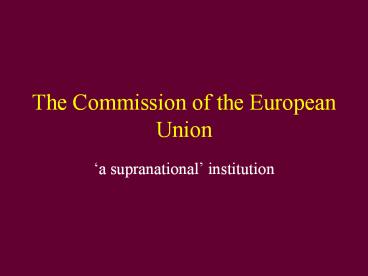The Commission of the European Union - PowerPoint PPT Presentation
1 / 17
Title: The Commission of the European Union
1
The Commission of the European Union
- a supranational institution
2
What is the function of the European
Commission? A - The European Commission has three
main tasks it introduces EU legislation, it
implements EU policy as approved by the Council
and the Parliament, and it acts as a watchdog to
ensure member states respect EU law and EU policy
decisions. The President and the members of the
Commission are appointed by the member states
(subject to the approval of the European
Parliament).
3
Institutions of the EU
- The Commission of the European Union
José Manuel Barroso Presdient of the
Commission, 2004 -
4
Commission
- Who/What is the Commission of the EU
- Commissioners are appointed by member states of
the EU and passed by the European Parliament - these are political appointments of governments
- the President of the European Union is now
involved in the appointment of the other
Commissioners - the Commission has a five year term
- this coincides with the term of the European
Parliament
5
Commission
- What does the Commission do?
- it is like the Civil Service of the European
Union - it is more than a Civil Service, as it has a very
important right of initiating policy. This means,
the Commission can try to shape the agenda for
the European Union and pull often reluctant
member states into closer integration
6
Another view the Commissions role
- CREATIVE
- The Commission makes proposals for policy, i.e.
CAP, Environment, Competition policy, Social
policy etc. - The Commission is the Guardian of the Treaties -
it has a watchdog role
- BUREAUCRATIC
- a mediator honest-broker between the competing
interests of the member states and also between
the institutions of the European Union - administrators the civil service of the EU its
job is to ensure that Community policies are
implemented
7
How does the Commission go about its business?
8
Standard operating procedures of the Commission
- Innovative forms of regulatory policy have
developed - to reduce governments resistance to legislation,
but without imposing direct costs on EU/member
states target of regulation in the social
sphere has been chosen carefully - Redistribution , not an option - EU budget, only
2.4 of combined spending of member state - costs deflected unto individuals, companies and
away from governments
9
Standard operating procedures of the Commission
- Build a constitutency of support for European
action - get interest groups representing the vulnerable,
etc. so harder for govts. to ignore certain
social problems, - e.g. EAPN European Anti-Poverty Network
- Equality Womens Networks
- UNICE/ETUC
10
Standard operating procedures of the Commission
- Attempt to control the definition of problems
- Commissions analysis of problems will emphasise
common causes across the EU and suggest the need
for solutions coordinated from the European
level, I.e. Brussels - social policy area
- environmental issues
- competition
11
Standard operating procedures of the Commission
- Experiment with alternative institution building,
to circumvent resistance from member states - mangement and labour given a greater role in
policy formulation and policy impelmentation
(UNICE/ETUC), - 1995 the first social partner agreement was
concluded between these two bodies on parental
leave.
12
The Commission - the scapegoat
- portrayed as greedy for power
- politicians, the press, often blame the
Commission for problems, the Brussels
bureaucracy, faceless technocrats - appointees of governments, not elected so they
have no popular mandate
13
The Commission - in the doldrums
- March 1999 - college resigned en masse in the
face of withering charges of corruption and
mismanagement - French Commissioner - her dentist
- Reform in the air - since the Prodi Commission
this is regarded as a necessity
14
Prodi Commission and reform
- The rationale behind the reform is an acceptance
that the reach of the Commission had extended
beyond its grasp and that it had failed to keep
up with developments in its environment. In
particular, the Commission had been given a
growing number of executivefunctions by the
Council and the EP - The reform process is a multifaceted one
- impact on the formation of the Commission
- conduct of Commissioners,
- the internal operation of the Commission and its
relationship with other bodies in the Union.
15
Reform process is designed to
- 1. strengthen the regulatory framework within
the Commission to enhance its - capacity for self-regulation. This facet of the
reform contains codes of - conduct for Commissioners and officials,
modernisation of the internal - rules of procedure and appointment, and major
changes in financial - management and control.
- 2. modernise the management of individual
directorates by enhancing the - targeting of particular tasks, evaluation and
accountability. The emphasis - here is on Activity Based Management, more
efficient work practices - cutting red tape and simplifying procedures and
systems. - 3. alter the internal allocation of human
resources and improve recruitment, - promotions and training (Kinnock 2000).
16
Unique character as an international institution
- no other institution with its mix of political
and administrative skills - headed by a cabinet with designated mandates,
approved by governments acted as a college - working to a set of goals that had a degree of
definition in the Treaty of Rome - has quasi-judicial power in certain areas, e.g.
abuse of market
17
Unique character as an international institution
(b)
- works within, subject to and applies a system of
rules embodied in the legal system of the
Community/Union - has a key position in the diplomacy of the EU,
can build coalitions among actors, directly
participates in the discussions of the Council of
Ministers, has detailed awareness of governments
difficulties with policies.































